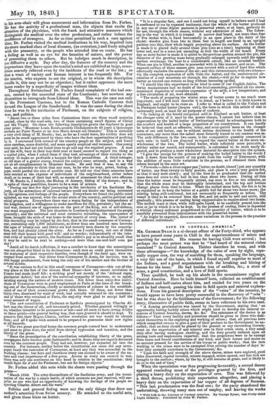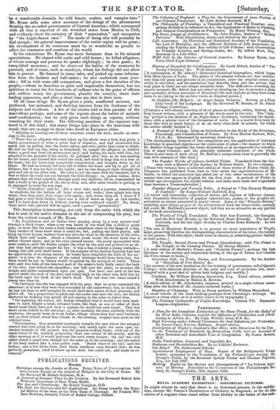LIFE IN CENTRAL AMERICA..
Mt. GEORGE BYANI is a ci-devant officer of the Forty-third, who appears to have passed some years in Chili in the superintendence of mines and searching for metals. His reasons for leaving Chili were several ; but perhaps the most potent was that he "had heard of the mineral riches contained" in Central America. Thither therefore he went, and with these advantages—" the knowledge of the value of ores by sight, espe- cially copper ores, the way of searching for them, speaking the language, a very fair use of the lasso, in which I found myself superior to most of the Indians, and a good acquaintance with the breaking and bitting of horses for the lasso." He had besides lots of saddles, &c., a store of arms, a good constitution, and a love of field sports. Thus qualified, he took up his abode in the mountainous region of Central America. Here he built himself huts, collected an establishment of Indians and balf.castes about him, and resided for two years on the spot he had cleared, passing his time in field sports and mineral explora- tions. From his general description of the "veins" of the country, he would appear to have been pretty successful in the discovery of" ores"; but he was done by the faithlessness of the Government; for the following
story, illustrative of public faith, seems to have reference to his own case.
"A flaming proclamation was issued by the Government, stating that an opportunity having luckily arisen which might tend to develop the mineral re- sources of Central America, decree, &c. &c. The substance of the decree is as follows= That every facility and protection should be given to those who dedi- cated themselves to the exploring and working of mines; that all previous laws which compelled owners to give a part of their produce to the Government be an- nulled; that no duty should be placed by the present or any succeeding Govern- ment on the exportation of any mineral ores in their crude state, a very small duty after having undergone smelting, and the duty greatly reduced upon all mining tools and implements imported; that the proprietors were to be exempt from taxes and forced contributions of any kind, and their horses and mules on no account pressed for the service of the troops or public works ; that the men. working in the mines were to be exempted from serving the number of days' la- bour they annually contribute to the Government,' &c. "Upon the faith and strength of the above decree, mines were explored, good. lodes discovered, capital invested, miners engaged, mines opened, and fine rich ore brought to the surface ; where, by the by, it still remains at grass, and is likely to do so to the end of time."
When the speculation was thus progressing favourably, a second decree
appeared rescinding most of the privileges granted by the first, and placing a heavy duty on the exportation of ores. This was followed by a third decree, prohibiting their exportation altogether, and placing a heavy duty on the exportation of bar copper of all degrees of fineness. "This last proclamation was the final one; for the party abandoned the undertaking, throwing many men out of employ, and leaving the works
*Wild Lite in the Interior of Central America. By George Byatn, late Forty-third Light Infantry. Published by John W. Parker.
ts a comfortable domicile for wild beasts, snakes, and vampire bats." Mr. Byam adds some other accounts of the doings of the adventurers forming the so-called governments of Central America ; which correspond with all that is reported of the wretched states from Mexico to Chili, and evidently show the certainty of their "annexation" and occupation by"the Anglo-Saxon race." The mode of doing this will probably be foul enough; the general improvement of the entire region will be great ; the development of its resources must be so wonderful as greatly to affect the commerce and comforts of the world.
In his relaxations Mr. Byam was more fortunate than in his mineral speculations. He chased wild cattle and wild beasts ; he killed alligators, of whose courage and prowess be speaks slightingly ; he shot game; be vanquished monsters ; and he observed the habits of the creatures he pursued, and of some, such as monkeys, whom his feelings did not allow him to pursue. He listened to many tales, and picked up some informa- tion from the Indians and half-castes ; he also undertook some jour- tiles; fell in with some odd companions, and gives a few sketches of the people,—whom he describes as quiet and respectable themselves but too spiritless to resist the few hundreds of ruffians who in the guise of officers and soldiers usurp the government, plunder the country, shoot their leading opponents, and after a short time are shot in their turn.
Of all these things Mr. Byam gives a plain, unaffected account, not profound, but animated, and deriving interest from the freshness of the subjects and incidents. A few of the stories told to him partake of the marvellous perhaps, and some of the reports about the habits of animals need confirmation ; but he only gives such things as reports, without vouching for their truth. The following anecdote of the capturer cap- tured is of this kind ; but many things take place in the American wild woods that are strange to those who dwell in European cities.
"Alluding to lassoing one of these monsters round the neck, recalls an anec- dote to the point.
"There was an alligator who had taken up his abode near a ford, had given a dusky acquaintance of mine a great deal ot vexation, and had occasioned him much loss by pulling into the water calves, and even cattle, that came to drink. He told me that one day, being on horseback, he caught the alligator in shallow water, a good way from his accustomed pool; and having his lasso with him, but attached to the pummel of his saddle, he galloped after him as he was making for his haunt, and lassoed him round the neck, and tried to drag him to a tree on the bank ; but his horse was completely overpowered, and brought down on his knees. He had no remedy left him but to follow the beast and try to get rid of hislasso, but it was too fast to the saddle; and he was dragged right through the pool and out at the other side. He tried to cut the lasso with his machete, but it was so blunt he could not cut through the hide-thongs; so, nolens coleus,- down stream they all went together, through pools and shallows, till he remembered he had a knife in the pocket of his sheep-skin, and, after some trouble in getting at it, managed to sever his tow-rope. "'Never, Caballero,' said he, did a man take such a journey, sometimes in he shallows, but the bottom all large stones and rocks ; then splash into deep water, then deep mud, then stones over again ; and, worse than all, I knew if I had gone a very little further, there was a fall of water as high as this rancho, and I to have gone down it without having even confessed myself! No, Senor, there never was, npr ever will be again, such a paseo! ' (promenade)."
This description is interesting, not only from the rarity with which the boa is seen in his native domains in the act of compressing his prey, but from the critical remark of Mr. Byam. "An Englishman and an Indian were passing along by a very narrow trail through a thick forest, when a cry was heard in the wood like a child in great pain, or more like the noise a hare makes sometimes when in the fangs of a dog. 'They neither of them knew what it could be; but, palling out their pistols, and 'tying up their horses, worked their way into the wood in the direction of the cries, which were still heard. About a hundred yards inside the wood there was a rather thinner space, and as the cries seemed nearer, the party approached with more caution until the Indian caught the other by the arm and pointed to an ob- ject that had already caught his eye: it was a boa crushing a young roebuck— young, but still with short horns. If the sculptor of the famous Laocoon had had an opportunity of studying nature, he would have simplified the folds of his ser- pents: it is true the elegance of the varied twinings would have been lost, but what would be lost in beauty would be gained by the strength of truth. There were only two folds of the heaviest part of the snake's body fairly round the body of the deer, just behind the shoulders ; one fold over the other, to increase the weight and power concentrated upon one spot. The head and neck of the boa passed under the neck of the deer, and rising high on the other aide, held fast by the teeth upon the back of the deer's head. The tail had two turns round a young tree close by.
'So furiously was the boa engaged with his prey, that he never remarked the observers: it is true they were well concealed by the underwood ; bat, no doubt, if he had not been so well occupied he would have been aware of their presence, and glided off. On a proposition to pitch into the snake and save the deer, the Indian answered by walking very gently off and signing to the other to follow him.
"On regaining the horses, the Indian remarked that it would have been mad- ness to have fought a large, irritated brute, like that, as one or other of them would most likely have got such a squeeze he would not soon forget. This was about seven o'clock in the morning; so, after marking the trees carefully with the machetes, the party went on to an Indian village where they had some business; and on their return, about four o'clock in the evening, stopped once more at the notched trees.
"Dismounting, they proceeded cautiously towards the spot where the unequal contest had been going on in the morning; and nearly upon the same spot, ex- tended straight on the ground, was the porpoise-looking brute, with one of the small horns of the roebuck protruding from one corner of his mouth, and the other seeming as if it would perforate the neck every instant: the tail was still coiled round a small tree, though not the same as in the morning ; and the centre
of his body looked like a nine-gallon cask. Stand clear of the tail,' said the Indian; and a few blows from their sharp machetes soon finished him: he was perfectly powerless; tried to throw up the deer, but could not; and made no re- sistance."



























 Previous page
Previous page